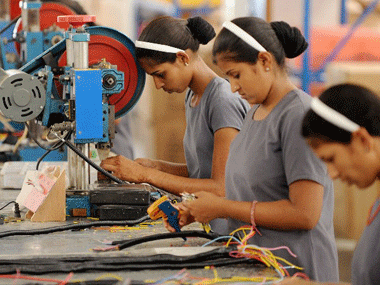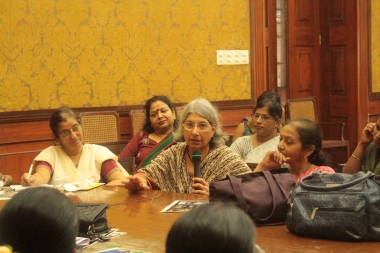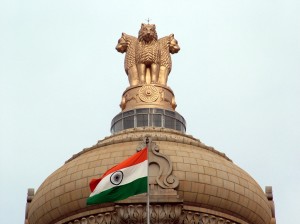
The Women Justice Initiative branch at Human Rights Law Network organized a meeting on the afternoon of 28th July 2015 at the Asiatic Library Mumbai and women from different organized sectors in Mumbai participated in the meeting which was aimed at discussing the implementation of Sexual Harassment of Women at Workplace (Prevention, Prohibition and Redressal) Act, 2013 in their respective organizations.

The Sexual Harassment of Women at Workplace (Prevention, Prohibition and Redressal) Act, 2013 is a legislative act in India that seeks to protect women from sexual harassment at their place of work. The Bill got the assent of the President on 23 April 2013 and the Act came into force from 9 December 2013. This statute superseded the Vishakha Guidelines for prevention of sexual harassment introduced by the Supreme Court of India {Vishakha and others V. State of Rajasthan and others. (AIR 1997 SUPREME COURT 3011)}. While the Vishakha guidelines given by the Supreme Court in 1997 expressly covered only government, public sector and private enterprises and there was no clarity on whether employees working in NGOs, sports complex, stadiums etc were covered, as there may be no strict employee-employer relationship, the Act on the other hand expressly covers almost all types of organizations, including NGOs, hospitals, sports institute, complex or stadiums.
However it was reported by the International Labour Organization that very few Indian employers were compliant to this statute. Most Indian employers have not implemented the law despite the legal requirement that any workplace with more than 10 employees need to implement it. As for those places of work where there are less than 10 employees it is the duty of the district officer (district magistrate or additional district magistrate or collector or deputy collector) to constitute in the district concerned a committee known as the Local Complaints Committee and follow the procedure of the act but the same is also utterly scare.
Here at HRLN the Women’s Justice Initiative Wing, decided ensure that the members and their respective organizations were aware about the law and were in compliance with the rules of the Act.
The meeting was first addressed by Miss.Neha Prakash from HRLN who stated the two main agendas for the meeting being:
1)To form Complaint Committees where there are none and if they are existing to see to their proper functioning as per Section 4(Constitution of Internal Complaints Committee) and Section 7(Constitution of Local Complaints Committee).
2) Resource pooling by way of gathering different women members of the organized sector and forming a larger body for women to redress their queries or grievances if any.
The Sexual Harassment Act 2013 being a relatively new law is facing several problems in implementation. People at large are more pensive about the act being misused when it hasn’t been completely used to its potential in the first place.
The first speaker of the afternoon was Armaity Irani from Centre of Indian Trade Unions(CITU). Her opening statement was the very well known fact about how India being a patriarchal society needs more stringent laws for the protection of women as they are vulnerable to face harassment in almost all spheres of life.
Mrs.Kamakshi Bhate from BMC Gender Resource Centre who was the second speaker familiarized all the members that women who deal with sexual harassment are very skeptical about filing complaints due to the various adversities they have to face before during and after the procedure of filing complaint .The major reason of this problem being the mechanism failure of the internal complaints committee. Upon speaking about the Internal Complaints Committee (ICC) not very surprisingly it came to our knowledge that in several unions and places of work there was no ICC set up at all and if it was set up, the Presiding Officers were not vacated after completion of their tenure which is 3 years as per section 4 of the act. Another setback faced by most women is that they fear to make a written complaint and only want to make oral complaints in fear of losing their employments. However the Act requires the aggrieved complainant to make a written complaint as per section 9(1). The second hurdle in the process of inquiry where women mostly do not stress on deterrent punishment but merely leave it to a warning of not repeating the said incident. Here it is the role of the ICC to ensure that the recommendations given by them are in accordance with the intensity of the offence as regards to the service rules to be followed by the employee.
The conclusive details of the meeting were to take certain measures, them being:
1) Preventive policies to be propagated by all members of meeting in their respective law firm with help of HRLN.
2) Checklist of all the activities which can be performed by each member present in helping the formation of a resource pool to secure women’s rights against sexual harassment.
3) Scheme to be followed by all members present which will be created by a collaborative effort between members and HRLN team.
4) Regular discussion of problems and ideas via emails and formation of a group on social network (whatsapp)
5) Holding regular meetings regarding the above mentioned issues.
6)Acting as a pressure group in order whenever needed to support any troubled member of the meeting or any distressed woman in the workplace of the member with the consent of the aggrieved .
The meeting was concluded on this note.
-Jhinuk Alvares
Law Student (Intern at HRLN, Mumbai)











